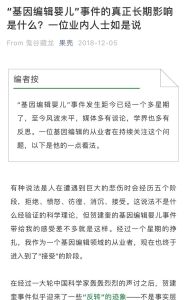
A Chinese Researcher Edited the Genes of Babies – the Experiment Will Have Lasting Impact in the Medical Field
Read or listen offline
Amazon KindleRecommendation
In November 2018, Chinese researcher He Jiankui announced that he had altered the genes of baby twins to prevent them from contracting HIV. Prior researchers had only modified human genes of adults to treat deadly diseases. In those cases, changes were confined to that person – whereas the embryos carry modified genes that their children can inherit. He’s announcement triggered an immediate backlash from the global scientific community. The Chinese government ordered an immediate halt to He’s research. Investigators discovered that He forged ethical review papers and deliberately evaded supervision during his work. In January 2019, Chinese officials confirmed that a second woman became pregnant during the experiment. Despite the criticism, He’s controversial experiment will likely speed up the development and application of human gene editing. In this article from science and technology media platform Guokr, Guigu Canglong, a PhD gene-editing student, discusses the implications of this experiment in this good supplementary read for anyone following the news. Guigu doesn’t judge the ethics of the case, but asks “now what?” instead.
Summary
About the Author
Guigu Canglong is a PhD student of neuroscience and gene-editing.
















Comment on this summary